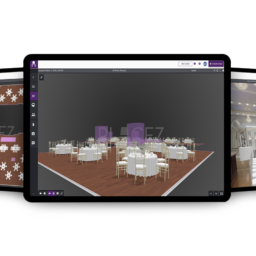The hospitality industry is experiencing a technological renaissance. For event planners, venue owners, and hospitality professionals, staying ahead of these innovations is crucial for enhancing customer experience and maintaining a competitive edge. Here, we explore the top tech trends to transform the hospitality landscape in 2024.
- Artificial Intelligence and Machine Learning
Personalized Customer Experiences
Artificial Intelligence (AI) and Machine Learning (ML) revolutionize how guests interact with hospitality services. By analyzing vast data, AI algorithms can offer personalized recommendations, predict guest preferences, and optimize booking processes.
Example Applications:- Chatbots and Virtual Assistants: Tools like IBM’s Watson Assistant can handle customer inquiries and bookings and provide personalized suggestions.
- Dynamic Pricing Models: AI can adjust prices in real-time based on demand, competitor pricing, and other market conditions to maximize revenue.
Predictive Maintenance
Machine Learning algorithms can predict equipment failures before they happen, ensuring your venue operates smoothly without unexpected downtimes. This enhances the customer experience and saves costs associated with emergency repairs.
- Internet of Things (IoT)
Smart Rooms and Venues
IoT devices enable a seamless and interconnected guest experience. From smart thermostats and lighting to door locks and entertainment systems, IoT-enabled venues offer convenience at the touch of a button.
Example Applications:- Voice-Activated Controls: Integrations with voice assistants like Amazon Alexa or Google Home allow guests to control room settings verbally.
- Automated Check-In/Check-Out: Guests can use their smartphones to check in, access their rooms, and check out without visiting the front desk.
Enhanced Security
IoT can enhance venue security through intelligent cameras, motion detectors, and connected alarm systems. These devices can be monitored in real-time, ensuring a safe environment for guests.
- Augmented Reality (AR) and Virtual Reality (VR)
Immersive Experiences
AR and VR technologies can create immersive experiences that captivate guests and elevate events. From virtual venue tours to interactive event setups, these technologies offer a new dimension of engagement.
Example Applications:- Virtual Venue Tours: Prospective clients can explore event spaces remotely before making a booking, saving time and resources.
- Interactive Event Enhancements: AR applications can provide interactive maps, real-time event updates, and augmented experiences during events.
Training and Simulation
VR can also be a valuable tool for staff training. It allows employees to practice handling various scenarios in a controlled, virtual environment, which can improve service quality and response times.
- Contactless Technology
Safe and Efficient Transactions
The demand for contactless solutions has surged and has been driven significantly since the pandemic. Contactless technology ensures safe and efficient transactions, enhancing customer satisfaction and operational efficiency.
Example Applications:- Mobile Payments: Services like Apple Pay and Google Wallet enable fast, secure transactions.
- Contactless Check-In/Check-Out: QR codes and NFC technology allow guests to check in and out with minimal physical interaction.
Digital Menus and Ordering
Restaurants and event venues are increasingly adopting digital menus that are accessible via QR codes. Guests can order and pay from mobile devices, reducing wait times and minimizing physical contact.
- Data Analytics and Big Data
Informed Decision-Making
Data analytics and big data are unlocking unprecedented insights into customer behavior and preferences. By analyzing this data, hospitality professionals can make informed decisions to enhance service offerings and operational efficiency.
Example Applications:- Customer Sentiment Analysis: Tools can analyze social media and review data to gauge customer sentiment and identify areas for improvement.
- Operational Analytics: Platforms help visualize and analyze operational data, driving better decision-making.
Targeted Marketing
Big data enables highly targeted marketing campaigns. By understanding customer demographics, preferences, and behaviors, businesses can craft personalized marketing messages that resonate more effectively with their audience.
- Blockchain Technology
Secure Transactions and Data Management
Blockchain offers a secure and transparent way to manage transactions and data, reducing the risk of fraud and enhancing trust.
Example Applications:- Secure Payments: Blockchain ensures that transactions are safe and tamper-proof, particularly important for high-value bookings and payments.
- Identity Verification: Blockchain can streamline the verification process, ensuring that only authorized individuals can access certain areas or services.
Loyalty Programs
Blockchain can also enhance loyalty programs by providing a transparent and secure system for tracking and redeeming points. This can increase customer engagement and retention.
- Sustainable Technology
Eco-Friendly Innovations
Sustainability is becoming a key focus in the hospitality industry. Technology is crucial in helping businesses reduce their environmental footprint.
Example Applications:- Energy Management Systems: Tools monitor and optimize energy usage, reducing waste and lowering costs.
- Water Conservation Technologies: Smart irrigation systems and low-flow fixtures help conserve water without compromising guest comfort.
Sustainable Materials and Practices
Investing in sustainable materials and practices, such as using eco-friendly cleaning products and reducing single-use plastics, benefits the environment and appeals to the growing number of eco-conscious consumers.
Conclusion
As we move into 2024, the hospitality industry is poised for significant technological advancements. By embracing AI, IoT, AR/VR, contactless technology, data analytics, blockchain, and sustainable innovations, hospitality professionals can enhance customer experiences, streamline operations, and stay ahead of the competition. Staying informed about these trends is essential for event planners, venue managers, and hospitality professionals. Adopting these technologies will improve guest satisfaction and drive business growth and success in an ever-evolving industry. By staying ahead of these trends, you can ensure your business remains competitive and continues to delight customers with exceptional service.















